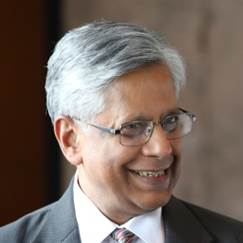Biography
Kilaparti Ramakrishna is the Director of the United Nations Economic and Social Commission for Asia and the Pacific (UNESCAP) East and North-East Asia Office in Incheon, Republic of Korea. The Office covers six member States of ESCAP- China, the Democratic People’s Republic of Korea, Japan, Mongolia, the Republic of Korea, and the Russian Federation, and two Associate members – Hong Kong and Macao. The Office also serves as the Secretariat of the North-East Asian Subregional Programme for Environmental Cooperation (NEASPEC).
Before joining ESCAP, Dr. Ramakrishna, an internationally-known climate policy leader and environmental lawyer, was with the Woods Hole Research Center (WHRC) in a 3-fold position: Holder of Sara Shallenberger Brown Chair in Environmental Law and Policy; Director, WHRC Policy Program, and Vice President. He is a lead author of the current assessment (and many before it) by the Intergovernmental Panel on Climate Change (IPCC). In addition, Dr. Ramakrishna taught at several law schools, including the Fletcher School of Law and Diplomacy, Harvard Law School, Boston University, Boston College Law Schools, and Yale University.
Regarding experience with the United Nations system, Dr. Ramakrishna worked for over five years in many capacities, including as the principal policy advisor to the executive director of the United Nations Environment Programme. His other responsibilities included UNEP’s Chief of Cross-sectoral Environmental Issues and Deputy Director in the Division of Policy Development and Law. He was a Special Advisor to the United Nations in drafting the UN Framework Convention on Climate Change and also assisted with work on the Intergovernmental Negotiating Committee of the Convention on Biological Diversity (CBD) and subsequently worked for a while as the Principal Officer for Implementation in the CBD secretariat, Montreal. Dr. Ramakrishna also helped establish the independent World Commission on Forests and Sustainable Development and served as its Coordinator.
Having received his academic training in sciences and law in India, Dr. Ramakrishna joined Harvard Law School in Massachusetts. His research interests were largely in how developing countries cope with emerging environmental problems and what role if any, laws, regulations, the judiciary, and civil society might play in this.
Dr. Ramakrishna is an elected life member of the Council on Foreign Relations and World Academy of Arts and Sciences, and serves on the board of trustees of Consensus Building Institute in Cambridge, Massachusetts. He holds bachelor's degrees in law and sciences and master's and doctorate degrees in international environmental law. He is married with two children.
Before joining ESCAP, Dr. Ramakrishna, an internationally-known climate policy leader and environmental lawyer, was with the Woods Hole Research Center (WHRC) in a 3-fold position: Holder of Sara Shallenberger Brown Chair in Environmental Law and Policy; Director, WHRC Policy Program, and Vice President. He is a lead author of the current assessment (and many before it) by the Intergovernmental Panel on Climate Change (IPCC). In addition, Dr. Ramakrishna taught at several law schools, including the Fletcher School of Law and Diplomacy, Harvard Law School, Boston University, Boston College Law Schools, and Yale University.
Regarding experience with the United Nations system, Dr. Ramakrishna worked for over five years in many capacities, including as the principal policy advisor to the executive director of the United Nations Environment Programme. His other responsibilities included UNEP’s Chief of Cross-sectoral Environmental Issues and Deputy Director in the Division of Policy Development and Law. He was a Special Advisor to the United Nations in drafting the UN Framework Convention on Climate Change and also assisted with work on the Intergovernmental Negotiating Committee of the Convention on Biological Diversity (CBD) and subsequently worked for a while as the Principal Officer for Implementation in the CBD secretariat, Montreal. Dr. Ramakrishna also helped establish the independent World Commission on Forests and Sustainable Development and served as its Coordinator.
Having received his academic training in sciences and law in India, Dr. Ramakrishna joined Harvard Law School in Massachusetts. His research interests were largely in how developing countries cope with emerging environmental problems and what role if any, laws, regulations, the judiciary, and civil society might play in this.
Dr. Ramakrishna is an elected life member of the Council on Foreign Relations and World Academy of Arts and Sciences, and serves on the board of trustees of Consensus Building Institute in Cambridge, Massachusetts. He holds bachelor's degrees in law and sciences and master's and doctorate degrees in international environmental law. He is married with two children.

